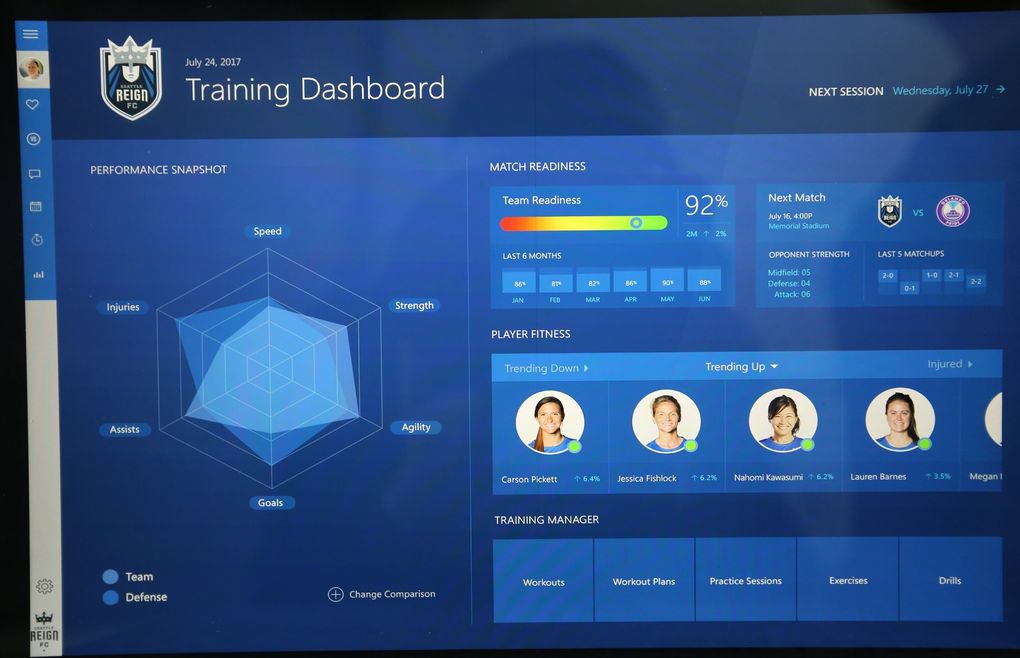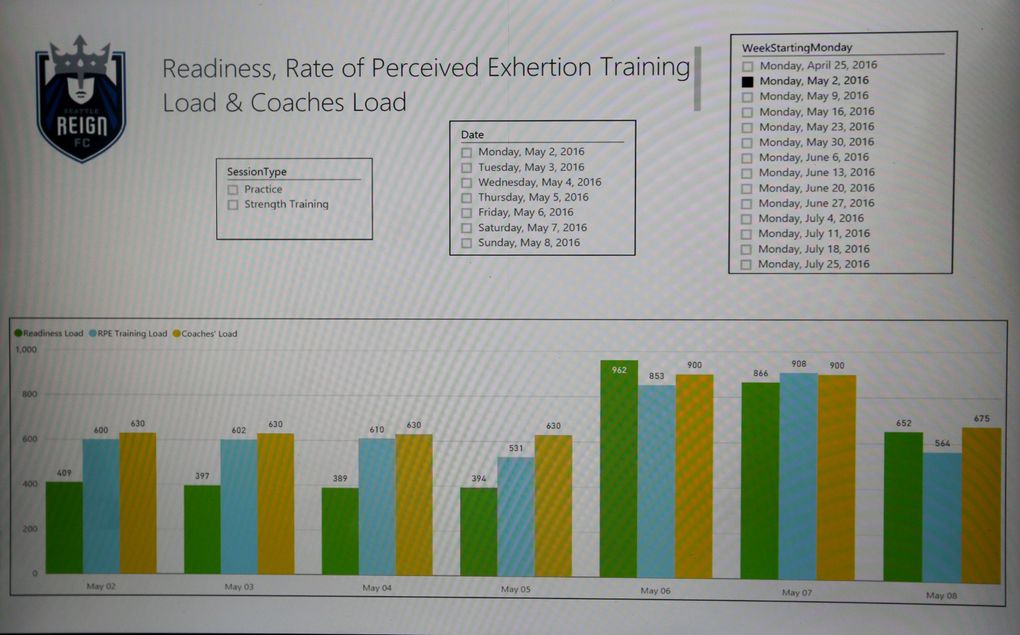The Seattle Reign’s win against their archrival early this month was the product of conditioning. And the singular talent of Megan Rapinoe.
The U.S. women’s national soccer team star struck first with a 30-yard sprint that caught a Portland Thorns center back off guard, intercepting a lazy pass for a tap in goal.
In the second half, Rapinoe, who just turned 32, outran a younger defender to get on the end of a long pass and launch a strike from the corner of the penalty box.
The tallies extended her scoring lead in the National Women’s Soccer League, a remarkable feat for a player a year and a half after major knee surgery.
The team in charge of keeping her fit and on the field has a new tool at its disposal: data-tracking software built by Microsoft. The Reign is among the dozen teams piloting Microsoft’s Sports Performance Platform, which officially launched last month.
The software is part analytics display tool, part web-based data repository.
The Reign players take a brief wellness survey daily, rating sleep, soreness and hydration. GPS and heart-rate trackers that they wear during training sessions and games feed in data about how much ground players cover and how hard they’re working.


The result is dashboards for individual players and the team that aim to score readiness, and, using Microsoft’s machine-learning algorithms, flag at what point the stress of a season could be leading to an injury and time away from the field.
“The reason we do it is to prevent injury,” coach Laura Harvey said. “So far, so good.”
Of course, the Reign also uses the tool because Microsoft pays it to do so, part of the sponsorship that placed the company’s name and logo on the front of the team’s jerseys.
The Redmond company’s influence is felt primarily in the corporate workplace. But Microsoft has spent big in recent years on sponsorship rights for sports leagues and teams in an effort to associate the brand with something people care about more than office software.
The deals include a $400 million pact with the NFL sealed in 2013, as well as sponsorships of NASCAR and the PGA tour. Closer to home for the Reign, Microsoft spent a reported $30 million in 2014 on a deal with Spanish soccer giants Real Madrid.
Those arrangements aren’t just advertising. They’re structured to include commitments to use Microsoft technology, whether Surface tablets on NFL sidelines or Real Madrid’s back-office use of customer tracking software.
But unlike those leagues, in which teams are often able to afford legions of sports staff and customize their own software tools, the Reign is a lean organization, part of a fledgling 5-year-old effort to reboot top-flight women’s soccer in the U.S. It offered Microsoft an open door to team officials as it tested the software.
“Part of what Microsoft wanted out of the partnership was to have a real-world test case, a team up on the platform,” the Reign owner Bill Predmore said. “For us, it gave us technology that we otherwise would not have been able to afford.”
On a recent Friday morning, players were spread around the worn artificial turf of Seattle Center’s Memorial Stadium, starters lined up opposite reserve players charged with demonstrating the tactics of the opponent they’d face the next day.
Coach Harvey moved the ball around the phantom Portland formation, showing players what she was expecting and how to exploit it.
“That is their weakest link,” she said, making eye contact around the squad for emphasis.
The day’s session ended with a few practiced free kicks, an easy day by design. The Reign had already played two games that week, a brutal bit of scheduling for a sport that can have players run miles worth of sprints over the course of a game.
“This is probably one of the lightest days we’ve ever done,” said Nick Leman, who helps outline training sessions with Harvey as the team’s director of high performance.
It’s Leman who has the most interaction with Microsoft’s tool, reviewing data after practice and discussing it with coaches at their daily meetings.
The primary benefit he hopes to draw is an objective gauge of how hard they are pushing players in training, and whether to dial it up or down. “It just validates what we’re trying to do,” he said, and can help flag “what’s out of the ordinary.”
Harvey said some in the game — steeped in its own traditions and with few in-game metrics to track — can be dismissive of data.
“In sports, we often get stuck in our ways,” Harvey said. “But when you stand still, you tend to get passed by.”
Steve Fox, the Microsoft manager who led the development of the software, said the company is increasingly trying to grow by building programs that cater to specific industries, rather than one-size-fits -all products.
The Sports Performance Platform’s data visualizations are based on Microsoft’s Power BI data-analytics tool, and, behind the scenes, the data housed by the system lives in the Azure cloud-computing platform. It was built over the course of 18 months by a seven-person team. Another 10 contributed a portion of their time through Microsoft’s Garage experimental software program.


The tool is technically free, Fox said, though Microsoft charges monthly fees depending on how much data teams store in the system.
The platform comes with widgets geared to five sports: soccer, American football, baseball, basketball and cricket, a favorite of Microsoft Chief Executive Satya Nadella.
Fox said the hope is that, should sports analytics become commonplace at the professional level, the company will be well positioned to sell services to the much broader pool of high school or collegiate teams.
Sports, he said, are “a tough nut to crack.”
It helped that Reign owner Predmore and Microsoft have a close relationship. Predmore’s Seattle-based digital marketing and technology consulting agency, Pop, has done hundreds of projects for Microsoft.
The agency is also pitching in on the sports platform, customizing it for the Reign’s needs. And as Microsoft expands the by-invitation-only software, Pop is one of two companies Microsoft plans to enlist to help interested customers get started.
“Every sports scientist has their things they’re looking for, they want their reports the way they want them,” Predmore said. “I think there is some authenticity to [Microsoft’s] approach with sports clubs. I think there’s a real opportunity there.”



